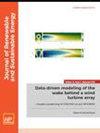Two three-dimensional super-Gaussian wake models for hilly terrain
IF 1.9
4区 工程技术
Q4 ENERGY & FUELS
引用次数: 0
Abstract
With the increase in wind farms in hilly terrain, it is particularly important to explore the downstream wake expansion of wind turbines in hilly terrains. This study established two complex terrain-applicable super-Gaussian wake models based on the Coanda effect and the wind speed-up phenomenon. Then, by considering the wind shear effect and the law of mass conservation, two three-dimensional (3D) super-Gaussian wake models were obtained. The 3D super-Gaussian models were used to describe the shape of the wake deficit and could reflect the wake changes in the full wake region. The introduction of the Coanda effect could reflect the sinking of the wind turbine wake on the top of a hilly terrain. And considering that the wind speed-up phenomenon could better reflect the incoming velocity distribution of the actual hilly terrain. The validation results demonstrated that the prediction results of the 3D super-Gaussian wake models had negligible relative errors compared to the measured data and could better describe the vertical and horizontal expansion changes of the downstream wake. The models established in this study can assist with the development of complex terrain models and super-Gaussian models, as well as providing guidance for power prediction and wind turbine control strategies in complex terrain.丘陵地形的两种三维超高斯唤醒模型
随着丘陵地形风电场的增加,探讨风力涡轮机在丘陵地形的下游尾流扩展问题显得尤为重要。本研究基于科恩达效应和风速上升现象,建立了两个适用于复杂地形的超高斯尾流模型。然后,通过考虑风切变效应和质量守恒定律,得到了两个三维(3D)超高斯尾流模型。三维超高斯模型用于描述尾流赤字的形状,并能反映整个尾流区域的尾流变化。科恩达效应的引入可以反映风机尾流在丘陵地形顶部的下沉。考虑到风速上升现象可以更好地反映实际丘陵地形的入风速度分布。验证结果表明,三维超高斯尾流模型的预测结果与实测数据相比,相对误差可以忽略不计,能较好地描述下游尾流的垂直和水平扩展变化。本研究建立的模型有助于复杂地形模型和超高斯模型的开发,并为复杂地形下的功率预测和风机控制策略提供指导。
本文章由计算机程序翻译,如有差异,请以英文原文为准。
求助全文
约1分钟内获得全文
求助全文
来源期刊

Journal of Renewable and Sustainable Energy
ENERGY & FUELS-ENERGY & FUELS
CiteScore
4.30
自引率
12.00%
发文量
122
审稿时长
4.2 months
期刊介绍:
The Journal of Renewable and Sustainable Energy (JRSE) is an interdisciplinary, peer-reviewed journal covering all areas of renewable and sustainable energy relevant to the physical science and engineering communities. The interdisciplinary approach of the publication ensures that the editors draw from researchers worldwide in a diverse range of fields.
Topics covered include:
Renewable energy economics and policy
Renewable energy resource assessment
Solar energy: photovoltaics, solar thermal energy, solar energy for fuels
Wind energy: wind farms, rotors and blades, on- and offshore wind conditions, aerodynamics, fluid dynamics
Bioenergy: biofuels, biomass conversion, artificial photosynthesis
Distributed energy generation: rooftop PV, distributed fuel cells, distributed wind, micro-hydrogen power generation
Power distribution & systems modeling: power electronics and controls, smart grid
Energy efficient buildings: smart windows, PV, wind, power management
Energy conversion: flexoelectric, piezoelectric, thermoelectric, other technologies
Energy storage: batteries, supercapacitors, hydrogen storage, other fuels
Fuel cells: proton exchange membrane cells, solid oxide cells, hybrid fuel cells, other
Marine and hydroelectric energy: dams, tides, waves, other
Transportation: alternative vehicle technologies, plug-in technologies, other
Geothermal energy
 求助内容:
求助内容: 应助结果提醒方式:
应助结果提醒方式:


